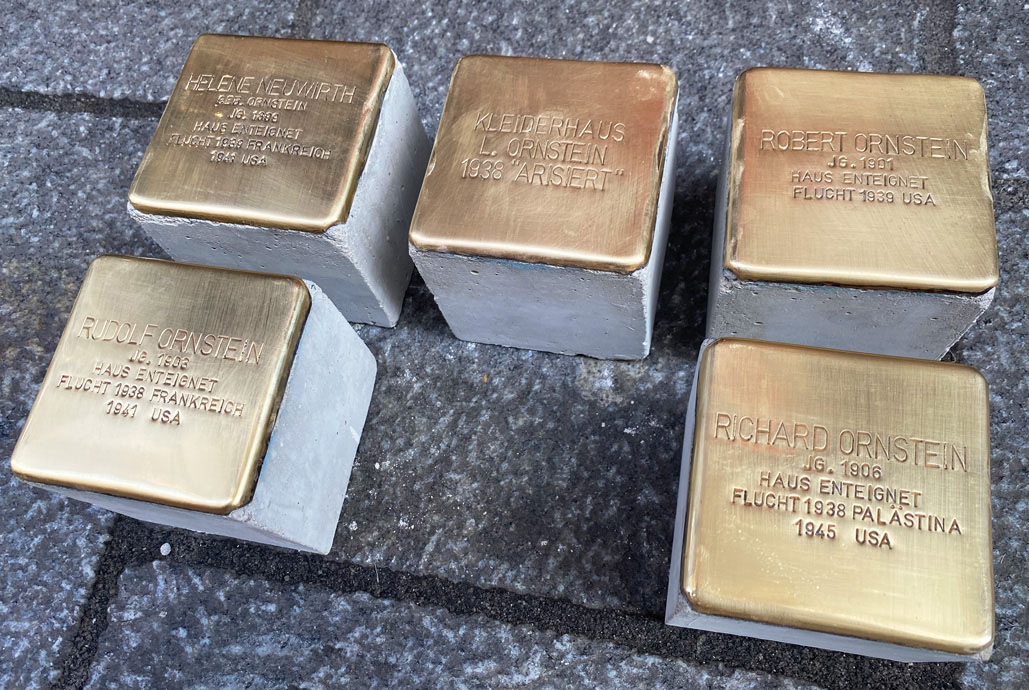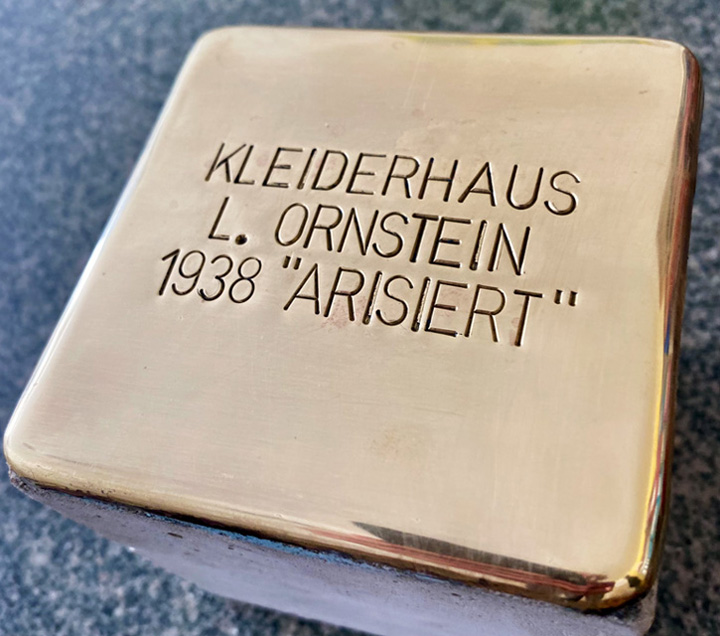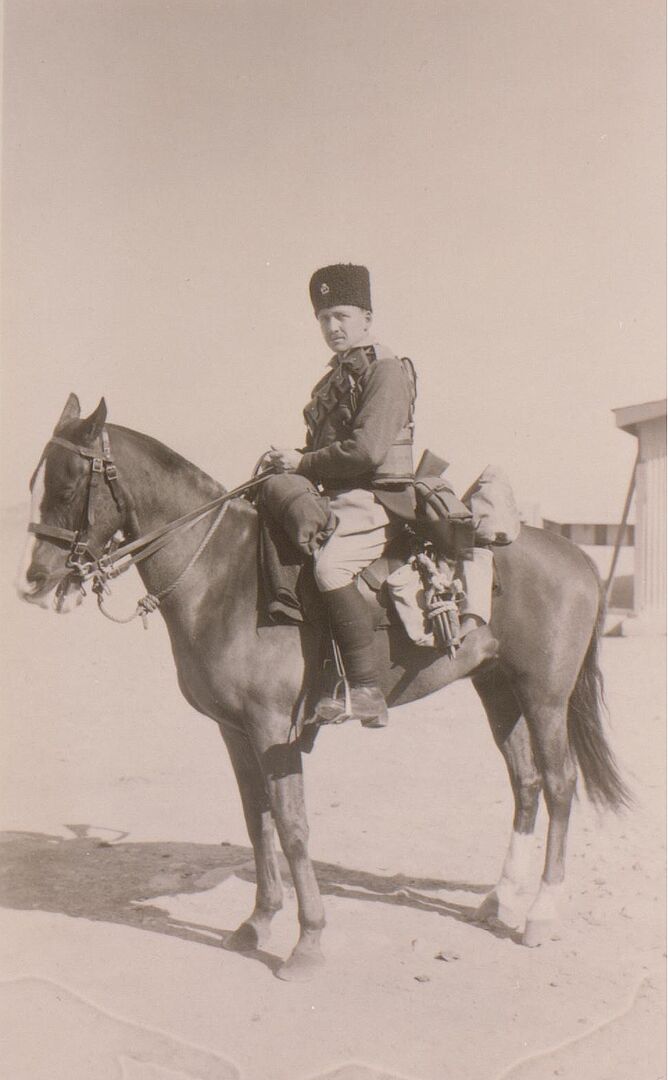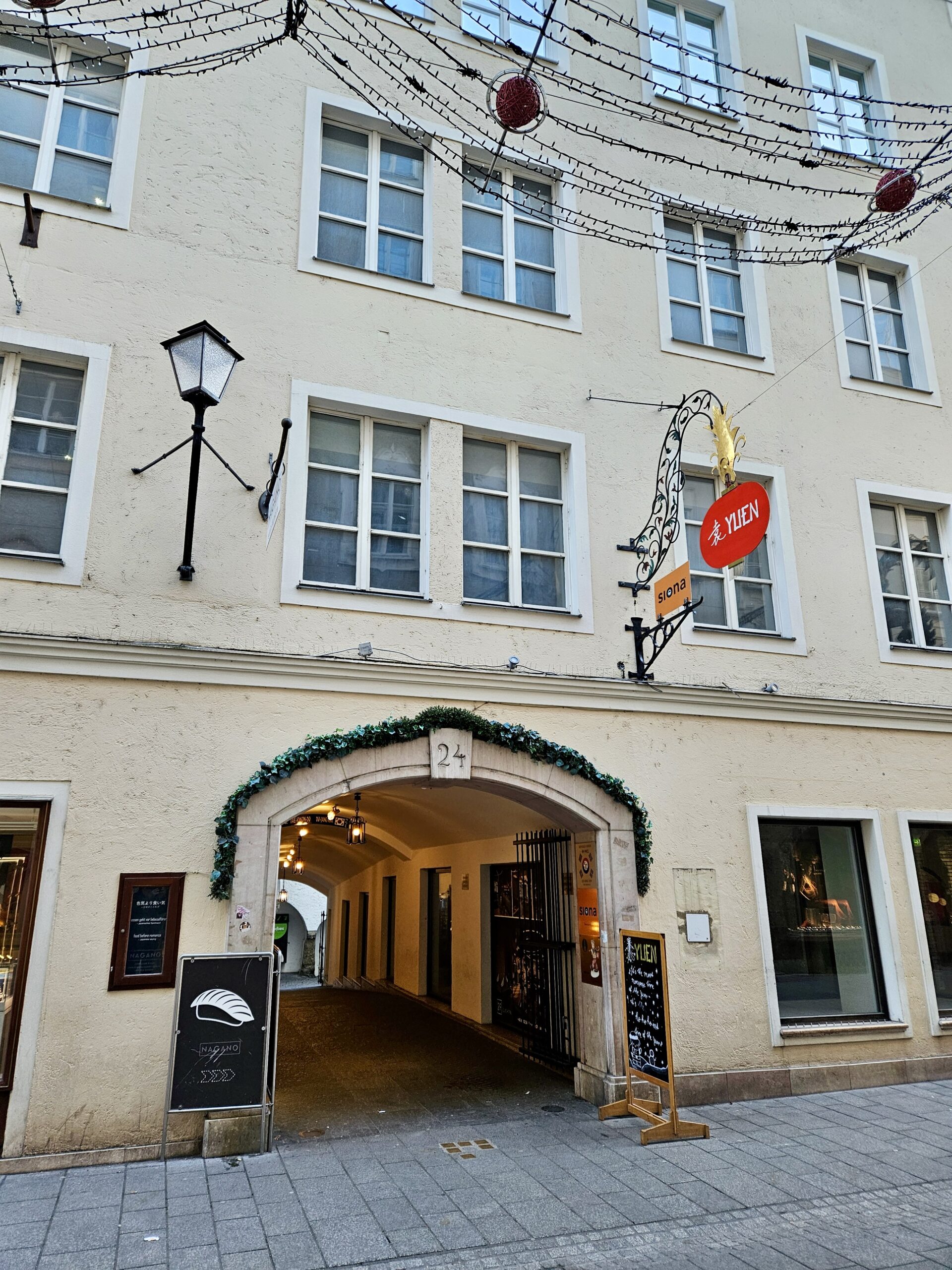Caroline Ornstein née Süss and Luser Nisson Ornstein had one daughter and three sons, all born in Salzburg:
- Helene ORNSTEIN was born on September 29, 1899 – and in 1919 she took her married name Helene NEUWIRTH,
- Robert ORNSTEIN was born on August 5, 1901,
- Rudolf ORNSTEIN was born on April 21, 1903 and
- Richard ORNSTEIN was born on September 24, 1906
They were one of about fifty Jewish families from1867 to 1918 who were finally allowed to settle in the city of Salzburg by the Austro-Hungarian monarchy after Jews had been banned from the city since 1498. And not only allowed to stay, they were granted the local citizenship rights known as »Heimatrecht.«
Luser Nisson Ornstein, the father of the four children had been born in the Austrian Crownland of Galicia (now part of Ukraine) in 1870, but he used the German forename Ludwig rather than Luser in his pubic and business activities. And in 1897 »Ludwig Ornstein« advertised in the newspapers that he was taking over the business of his brother-in-law Albert Süss at number 9 Universitätsplatz in Salzburg’s old town.
The Jewish families Kohn, Pollak and Süss families, who were all related to each other, were among the first allowed to settle in Salzburg after 1867 and had owned modest shops in Salzburg since the 1870s.
The Getreidegasse, where craft and trade signs line up, is the heart of Salzburg’s old town. In January 1914, Luser Nisson Ornstein bought the property at number 24 Getreidegasse as well as 24a, a small vaulted room that had served as a coffee brewery (land register EZ 365/366).
On June 30, 1914, just before the outbreak of WWI, Luser Nisson Ornstein opened the L. Ornstein Clothing Store at 24 Getreidegasse and his family lived above the store on the 2nd floor.
Luser Nisson Ornstein was undoubtedly one of the most successful Salzburg merchants while the Habsburg Monarchy ruled Salzburg. After its collapse he served as the president of Salzburg’s official Jewish community organization for two and a half years.
On September 10, 1923, L. Ornstein and S. L. Schwarz, two Jewish owned businesses in Salzburg’s old town, appeared for the first time at the top of the boycott list of the United Antisemitic League’s newspaper Der Eiserne Besen (The Iron Broom) – a publication aiming to destroy the economic existence of the Jews and drive them out of Austria. The founding generation of the Jewish community was once more being confronted with aggressive Antisemitism – envy, hate, and greed.
Caroline Ornstein died on August 12, 1927, and her husband Luser Nisson died on April 12, 1928. Both were buried in the Jewish cemetery in Aigen (then a separate community on the south side of the Salzburg city line, and now a neighborhood in the city).
Their death notices appeared in three daily newspapers. The siblings Helene NEUWIRTH, Robert, Rudolf and Richard ORNSTEIN each inherited a quarter of the property at 24 Getreidegasse including 24a.
Helene and Isaak (Julius) NEUWIRTH were married in the Salzburg synagogue in 1919, and had three children born in Salzburg: Paul (born 1920), Deborah (born 1923) and Albert (born 1925).
In 1927, the NEUWIRTH family acquired a property in the Riedenburg district known as the »Sand-Schlösschen« at 5 Reichenhaller Straße – along with 3 Reichenhaller Straße, a »caretaker’s house« in front of their house (land register EZ 82/205).
It is said that Helene’s husband Isaak, born in Drohobycz, Galicia, in 1886, was a very agile businessman. The other heirs Robert, Rudolf and Richard ORNSTEIN, who were a few years younger, were also merchants, but had different ambitions.
Robert, the eldest of the three brothers, was the manager of the L. Ornstein Clothing Store. However, he was often ill and in inpatient care. His marriage to the Jewish Anna Marie Stein in Vienna in 1933 broke up after a few years.
Robert’s younger brother Rudolf married the Jewish Edith (Dita) Braun from Vienna in the Salzburg synagogue on June 16, 1929. The couple had two children born in Salzburg: Ludwig (later changed to Louis, born 1930) and Ruth Karoline (born 1932), thus following a Jewish custom of using the first names of their deceased grandparents. The family rented the villa at 45 Giselakai on the right bank of the Salzach river.
Richard, the youngest and long unmarried brother, lived in the old family residence on the 2nd floor above the store. In the spring of 1930 he undertook a four-week trip to the USA – a business trip that made headlines in the press:
American business successes of a Salzburg ready-made clothing store.
It may not be known to everyone that the local large clothing factory L. Ornstein, at 24 Getreidegasse, producer of the popular loden coat brand »Weatherproof«, is the largest loden coat factory in Austria.
The partner in this company, Mr. Richard Ornstein, traveled to America in mid-April on the “Europa”, the well-known record-breaking ship of the North German Lloyd line, in order to introduce and propagate the »Weatherproof« brand there as well. The first orders have now been received. The original orders are displayed in the shop window of the Ornstein Clothing Store […].
Salzburger Volksblatt 30. 4. 1930, p. 7
They might have hoped for congratulations on their business success, but there was increasing resentment, envy and hatred instead.
On June 24 1933 and February 4, 1934– during the time when the Nazi Party was banned in Austria – L. Ornstein was the target of two terrorist attacks causing significant damage. In both cases the perpetrators were able to escape to nearby Nazi Germany. No Jew could feel safe in Salzburg, a city on the Austrian-German border.
It is remarkable that L. Ornstein Clothing Store, Salzburg’s largest store for men’s, women’s and children’s clothing, was able to flourish even in the crisis years and maintain its business connections abroad thanks to its own brand »Weatherproof Loden Coats«.
Isaak Neuwirth was a driving force at L. Ornstein and he made another business trip to visit his New York partners at Burn, Pollak & Beer in June 1937.
Richard ORNSTEIN became one of the only Jews prominent in the city of Salzburg’s social life: He was a member of the illustrious Salzburg Riding Association and won prizes as a tournament rider. He won show jumping tournaments on the gelding »Bromhill« and was recognized as one of the best elite riders in Austria. His activities in the Zionist movement, on the other hand, were not widely known.
Meticulous research shows that Richard’s brother Rudolf and his sister-in-law Edith were also active members of the local Zionist group in Salzburg. Edith ORNSTEIN gave a lecture on »Woman in Zionism« in 1930 in the presence of Salzburg’s Rabbi Dr. David Samuel MARGULES.
Edith’s husband Rudolf also gave Zionist lectures, including one in April 1934 about his trip to Haifa, Tel Aviv and Jerusalem called: »How I saw Palestine«.
Rudolf was chairman and his brother Richard was secretary of the local Zionist group until it was banned by the Nazis in March 1938. One of their plans was realized on November 15, 1937 when Rabbi MARGULES opened a Jewish library in the Salzburg synagogue.
Included in this library were some 140 books that the famous author Stefan ZWEIG had donated to the Jewish community in Salzburg when his house at 5 Kapuzinerberg was cleared in May 1937. This valuable collection disappeared without a trace in the violence of 1938 and has been forgotten.
Number 24 Getreidegasse was Richard ORNSTEIN’s last address in Austria, but he did not have to personally experience the terror of the Nazi rulers in Salzburg because he had traveled to Palestine before the »Anschluss« of March 1938 and had deregistered in writing from Tel Aviv (according to the police registration data In Salzburg).
In the violent year following the »Anschluss« the success story of the L. Ornstein Clothing Store ended abruptly. The family was robbed of their wealth. That is certain. But what did each individual have to endure?
The Salzburg Gestapo took the brothers Robert and Rudolf ORNSTEIN and their brother-in-law Isaak Neuwirth into so-called »protective custody« in order to accelerate their robbery and expulsion.
On May 10, 1938 the family NEUWIRTH had to leave their home in the Riedenburg neighborhood. In June 1938 their 18-year-old son Paul was able to take the final exams for his high school diploma (Matura) in Salzburg – and then took the next train to Paris.
At the beginning of July 1938 Rudolf, Edith, Ludwig and Ruth ORNSTEIN were evicted from their rented apartment in the riverside villa at number 42 Giselakai.
Rudolf suffered another imprisonment by the Gestapo while fleeing to France, but got there in the end. Edith, along with her 8-year-old son Ludwig and her 6-year-old daughter Ruth, had to move in to an apartment over the shop on the Getreidegasse, but at the beginning of October 1938 they were able to escae what had become an intolerably hostile environment.
The members of the NEUWIRTH and ORNSTEIN families who were still in Salzburg remained on the 2nd floor of 24 Getreidegasse along with their packed suitcases. They had to witness firsthand the »Aryanization« of their business premises by a Nazi competitor named Kurt Thalhammer.Thalhammer then advertised in the newspaper that he was going:
… to run the company L. Ornstein […] as an Aryan company in accordance with the requirements of the present. The company will reopen on Monday, September 19, Kurt Thalhammer, Salzburg, Getreidegasse 24
Salzburger Volksblatt September 17, 1938, p. 24
Judging from the Salzburg Gestapo reports there were no protests against this conspicuous robbery of a well-known local business from either the general population or the Catholic Church.
After the so called »Kristallnacht« pogrom of November 9-10, 1938, the head of the Salzburg Gestapo, SS-Sturmbannführer Karl-Heinz Rux, had 26 Jewish men deported to the Dachau concentration camp. Concentration camp prisoners Isaak Neuwirth and Robert ORNSTEIN were released on November 20, 1938 – for the purpose of »emigration«, as it was cynically called.
Robert ORNSTEIN seized the first opportunity to turn his back on the anti-Jewish city of his birth – by train to Paris.
The most urgent task for the NEUWIRTHs was to get their younger children to safety. Thirteen-year-old Albert and 15-year-old Deborah managed to get to England in December 1938 thanks to the Inter-Aid Committees for Children’s »Kindertransport«.
At the beginning of 1939, their parents managed to escape to Paris, where they were embraced by their son Paul and their family members Robert, Rudolf, Edith, Ludwig and Ruth. Rudolf and Edith sent their youngest child, Ruth, to Edith’s sister in England, and according to family lore Ruth spent much of the ensuing two years there before rejoining her parents in France.
Refugees needed visas, affidavits and tickets for ship passage to the free world, but Robert ORNSTEIN managed to master all these challenges before the outbreak of the Second World War. He hurried to Boulogne-Sur-Mer near Calais to cross the Atlantic on the SS Nieuw Amsterdam and arrived in New York on July 21, 1939.
Robert ORNSTEIN opened a new store In New York City at 1123 Broadway – marking a successful new beginning for the 38-year-old refugee. In 1943 he married an American named Adelaide Williams, and the couple had a daughter named Carolyn Beth Ornstein a couple of years later.
In December 1944 Robert ORNSTEIN became the first of his siblings to gain US citizenship.
When the Second World War began, those of his family members who were still in France were exposed to a special danger – internment and deportation – which they were able to escape with luck and skill. After serving briefly in the French army, Rudolf ORNSTEIN was able to get American visas for himself, his wife Edith and their children Ludwig and Ruth, in Marseille on March 14, 1941.
With the visas in hand, they traveled to Lisbon Portugal and got tickets for the Portuguese ship Serpa Pinto and arrived in New York on June 23, 1941. In August 1946 they became US citizens.
Helene, Isaak and Paul NEUWIRTH did not receive their long-awaited visas until May 10, 1941 in Lyon, after which they also traveled to Lisbon via Spain. There they took the opportunity to fly across the Atlantic on the Pan American Airways Dixie Clipper flying boat NC 18605. They arrived in New York on July 29, 1941. In November 1946 they too became US citizens.
Paul NEUWIRTH married Ruth Selig and had three children: Jack, Bernard and Donald. Deborah NEUWIRTH, who had found refuge in England, emigrated to the US in 1948. There she married Abraham Feldman and they had two children: Jane and Jonathan. Her brother Albert remained in England and anglicized his name to Albert John Newall.
None of them wanted to return to Salzburg after the war. The city of Salzburg had »Aryanized« the NEUWIRTH family’s house, their »Sand-Schlösschen«, and had turned it over to the notorious »Security Service of the Reichsfuhrer SS« (SD section Salzburg).
The head of the Salzburg SD section was SS Obersturmbannführer Alois Persterer – a war criminal who headed »Sonderkommando 10b« from 1941 – 1942 when it was engaged in massacring large numbers of Jews in the occupied Soviet Union.
In June 1948 the city of Salzburg had to return their looted property, which had served as quarters for SS murderers and was in a desolate condition, to the NEUWIRTHs. Understandably, they had no interest in ever living there again and sold their former home in the early 1950s.
After the liberation, the concentration camp survivor Walter Fuchs, a master tailor, became the manager of the L. Ornstein Clothing Store (which Kurt Thalhammer had »Aryanized« at a great loss for the owners).
The house and shop were restored to the siblings Helene NEUWIRTH, Robert, Rudolf and Richard ORNSTEIN in 1948 and the shop was reopened. Walter Fuchs enjoyed the confidence of the owners living in the USA and remained managing director until L. Ornstein closed in October 1957.
In the 1950s, traumatized family members revisited the place of their persecution. Unfortunately, they did not record anything about their visit. Only the dry data of the Salzburg registration police have been preserved.
From April to early September 1950, Rudolf and Edith ORNSTEIN, their 20-year-old son Ludwig and their 18-year-old daughter Ruth Caroline lived at 22 Fürstallergasse in the Parsch neighborhood.
Rudolf’s younger brother Richard stayed at a different address, 15 Bucklreuthstrasse in the Riedenburg neighborhood. Richard ORNSTEIN, who had also become a US citizen and gotten married, visited Salzburg with his wife Ellen Baruch and their daughter Beverly Jane (who had been born in New York in 1948).
For around four and a half months, from May to October 1957, Helene and Isaak (now anglicized to Isidor) NEUWIRTH were in Salzburg to arrange the sale of their house, as well as to work with his brothers-in-law to sell the L. Ornstein Clothing Store. The business, which had opened at 24 Getreidegasse in June 1914, closed forever in October 1957.
Helene NEUWIRTH, the oldest of the four siblings born in Salzburg, was widowed in 1978, and died in Lambeth, Greater London, in 1982.
Her children Paul and Deborah died in New York in 1997, and her youngest son Albert John Newall died in 2017 at Haywards Heath, a dozen miles north of the English seaside resort of Brighton.
Helene’s grandchildren Jack, and Donald NEUWIRTH live in the US, while their brother Bernard died in New York in 1990. Helene’s daughter Deborah had two children, Jane who lives in New York and Jonathan who lives in Israel.
Robert, the second oldest of the ORNSTEIN siblings, died in New York in 1969 (Mount Carmel Cemetery). In 1971 his younger brother Richard died in San Francisco (Home of Peace Cemetery). The US-born daughters of the two brothers live in the US, and all three (Carolyn Beth Cohen, Beverly Jane Schatz and Lauren Morrison) have children there.
Rudolf, the third oldest of the ORNSTEIN siblings, died in New York in 1983 and his wife Edith followed six years later (both in Maplewood Cemetery). While they were still alive, their son Ludwig (Louis) died in 1975. And in 2021 their daughter Ruth C. Robbins died as well. Both of them left children: Louis’s children Stephen, Stewart and Gary; and Ruth’s children: Daniel, David and Judith – all of whom live in the United States with their families.
Finally, it should be noted that the graves of the couple Caroline and Ludwig (Luser Nisson) Ornstein, founders of the L. Ornstein Clothing Store, survived undamaged in Salzburg’s Jewish cemetery despite the widespread destruction of Jewish cemeteries by the Nazis.
But, neither the expulsions nor the violent ends of other family members are visible in Salzburg’s Jewish cemetery.
Klara Chaje Grünhut (née NEUWIRTH), who lived at 24 Getreidegasse for a while, was a victim of the Shoah. As were her brother Max Moses NEUWIRTH (who lived in Salzburg until the November 1938 pogrom), his wife Henriette, and their daughter Gisela.
Sources
- Jewish Communal Organizations (Israelitische Kultusgemeinden) of Linz and Salzburg (the birth and death registers of the Salzburg organization were destroyed by the Nazi regime)
- Salzburg State Archives: land registers (EZ 365/366 und EZ 82/205)
- Salzburg City Archives: business files, local citizenship registers, police registration files, and the Krieger photo collection
- Dachau Concentration Camp Memorial
- Geduldet, geschmäht und vertrieben. Salzburger Juden erzählen, edited by Daniela Ellmauer, Helga Embacher and Albert Lichtblau. Salzburg, 1998, pp. 251-268
- Albert Lichtblau: »Arisierungen«, beschlagnahmte Vermögen, Rückstellungen und Entschädigungen in Salzburg, Wien-München 2004
- Jonathan Feldman: Family Chronicle (January 1, 2023)
- Correspondence with Jonathan Feldman and David Robbins
Translation: Stan Nadel
Stumbling Stone
Laid 13.09.2023 at Salzburg, Getreidegasse 24







